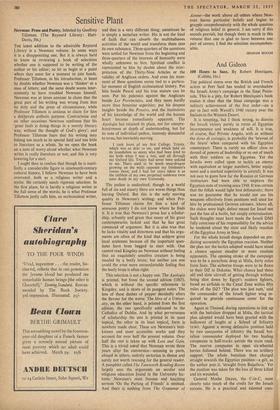Sensitive Plant
THE latest addition to the admirable Reynard Library is a Newman volume. In some ways it is a disappointing one. But it is always hard to know in reviewing a book of selections whether one is supposed to be writing of the author or his editor; so let us begin at a point where they seem for a moment to join hands. Professor Tillotson, in his introduction, is beset by doubts whether Newman was a 'thinker' or a man of letters; and the same doubt seems inter- mittently to have troubled Newman himself. Newman was at times anxious to claim that the great part of his writing was wrung from him by duty and the press of circumstance, while Professor Tillotson is anxious to claim for him a deliberate xsthetic purpose. Contrariwise and on other occasions Newman confesses that his 'great fault is doing things in a merely literary way, without the thought of God's glory'; and Professor Tillotson fears that his writing may belong too much to its special field and too little to literature as a whole. So we open the book on a note of worry about whether what Newman writes is really literature or not; and this is very lowering for a start. I ought then to confess that though he is mani- festly a considerable figure in nineteenth-century cultural history, I believe Newman to have been overrated, both as a religious writer and a stylist. He certainly needs rigorous selection. In the first place, he is hardly a religious writer in the full sense of the words; he is what Professor Tillotson justly calls him, an ecclesiastical writer, and that is a very different thing; sometimes he
is simply a sectarian writer. His is not the kind of faith that can absorb the multitudinous activities of the world and transform them into
its own substance. Three-quarters of the questions were settled for Newman from the beginning and three-quarters of the interests of humanity were
wholly unknown to him. Spiritual conflict is represented to him by doubts about the inter- pretation of the Thirty-Nine Articles or the
validity of Anglican orders. And even his treat- ment of these questions seems tied to a particu- lar moment of English ecclesiastical history. Put him beside Pascal and his true stature can be seen. Put his polemics against the Anglicans beside Les Provinciales, and they seem hardly more than feminine asperities; put his deepest insights beside the Pensees, and the limitations of his knowledge of the world and the human heart become immediately apparent. The Apologia has retained its place, not for compre- hensiveness or depth of understanding, but for its note of individual pathos, intensely distasteful to some, but inevitably moving.
I took leave pf my first College, Trinity, which was so dear to me, and which held on its foundation so many who had been kind to me both when I was a boy, and all through my Oxford life. Trinity had never been unkind to me. There used to be much snap-dragon growing on the walls opposite my freshman's rooms there, and I had for years taken it as the emblem of my own perpetual residence even unto death in my own University. The pathos is undoubted; though in a world full of sin and misery there are worse things than leaving Oxford. But this is the only moving quality in Newman's writing; and when Pro- fessor Tillotson claims for him a kind of sensuous poetry 1 do not know where he finds it. It is true that Newman's prose has a scholar- ship, urbanity and grace that many of his great contemporaries lacked and that he has great command of argument. But it is also true that he lacks vitality and directness and that his argu- ments are often of the kind that achieve great local acuteness because all the important ques- tions have been begged to start with. One cannot read Kingsley on Newman without feeling that an exquisitely sensitive creature is being mauled by a beefy brute; but neither can one avoid the even more uncomfortable feeling that the beefy brute is often right. This selection is not a happy one. The Apologia is printed, but from the second edition (1865), which is without the specific references to Kingsley, and is shorn of its pungent notes. The loss of these dashes of pepper decidedly alters the flavour for the worse. The Idea of a Univer- sity, on the other hand, is printed from the first edition, the one specifically addressed to the
Catholics of Dublin. And by what perverseness of scholarship the one is printed in its most topical, the other in its least topical, form is nowhere made clear. These are Newman's best- known and most accessible works and they account for over half the present volume. Over
half the rest is taken up with Loss and Gain. This is a trivial novel that Newman wrote three years after his conversion—amusing in parts, absurd in others, entirely sectarian in theme and surely not worth rescuing for the general reader. A pamphlet called The Tam worth Reading Room largely uses the arguments on secular and religious education found in the University lec- tures. Newman's most famous and touching sermon 'On the Parting of Friends' is omitted. And there is nothing from The Grammar of Assent—the work above all others where New- man leaves particular beliefs and begins to grapple comprehensively with the whole question of religious belief in general. I am sorry if this sounds peevish, but though there is much in this Volume that one is glad to have between one pair of covers, I find the selection incomprehen- sible.
GRAHAM HOUGH


































 Previous page
Previous page